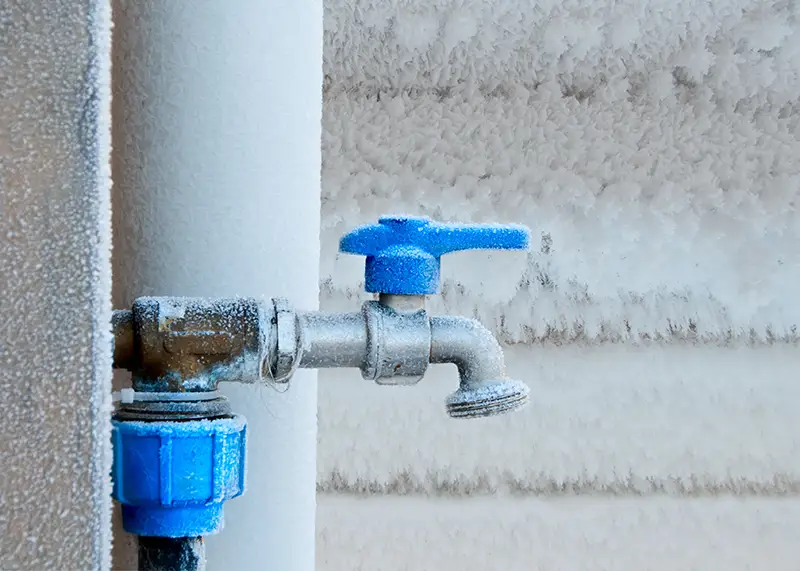
Winter weather brings with it the risk of frozen and burst pipes. Frozen pipes are a major cause of water damage, and the aftermath can be costly and frustrating. Understanding how water damage from a freeze happens and knowing what to do can save you time, money, and stress.
How Does Water Damage Happen During a Freeze?
When water freezes inside pipes, it expands. This expansion puts pressure on the pipe walls, which can cause them to crack or burst. Once temperatures rise and the ice melts, water begins flowing again—often into areas where it doesn’t belong. The result? Flooding, soaked floors, and damaged walls.
Common Causes of Water Damage During a Winter Freeze
Here’s a breakdown of the most common causes of water damage during a freeze:
- Frozen Pipes: The leading cause of freeze-related water damage. When pipes freeze and burst, they can release gallons of water into your home.
- Ice Dams: Ice builds up on the roof, preventing melting snow from draining. This can cause water to seep into the house through the roof and ceiling.
- Outdoor Faucets: If outdoor faucets and sprinkler systems aren’t properly winterized, water can freeze and cause the pipes to burst.
- Poor Insulation: Insufficient insulation can make pipes more likely to freeze. Pipes in places like basements, crawl spaces, attics, and exterior walls are especially vulnerable.
Your Emergency Can't Wait - At Your Door in 90 Minutes or Less
Call BCC Restoration now — 24/7 emergency response when you need it most.
360-953-8145Signs of Water Damage After a Freeze
Water damage after a freeze might not be obvious right away. However, there are key warning signs that you should keep an eye out for:
- Water Stains: Look for discoloration on ceilings, walls, or floors. This could indicate water seeping in from a burst pipe or ice dam.
- Damp Odor: If you notice a musty smell or visible mold growth, it’s a sign that water has entered your home and isn’t drying out properly.
- Wet or Buckling Floors: Moisture can cause wood floors to warp, carpet to become soggy, and tiles to loosen.
- Dripping or Leaking Water: If you hear or see water dripping from ceilings or walls, it’s a clear sign of damage.
- Sudden Spike in Water Bill: An unusually high water bill after a freeze could be a sign of a hidden leak or burst pipe.
Harmful Effects of Water Damage
Water damage from burst pipes in winter can lead to several problems for homeowners. Here are some common effects of water damage caused by burst pipes:
- Structural Damage: Water can seep into floors, walls, and ceilings, weakening the structure of your home. Over time, this may lead to wood rot, warping, and even collapse if not addressed quickly.
- Mold Growth: Excess moisture creates the perfect conditions for mold to grow. Mold buildup can cause health problems, especially for those with allergies or respiratory issues.
- Damaged Belongings: Burst pipes can flood rooms, damaging furniture, electronics, and personal items.
- Electrical Hazards: Water and electricity are a dangerous combination. Flooding from burst pipes can cause electrical shorts or even fires if the water reaches outlets or wiring.
- Expensive Repairs: Fixing water damage can be costly. Beyond the immediate cleanup, you might need to replace insulation, drywall, or flooring. The longer the water sits, the higher the repair costs.
- Higher Utility Bills: Leaking or burst pipes waste a lot of water. This can result in much higher water bills until the issue is fixed.
Steps to Take When Dealing with Burst Pipes
If you discover water damage after a freeze, quick action is essential. Handling water damage during winter can feel overwhelming. Follow these steps to minimize damage and avoid costly repairs:
- Turn Off the Water Supply: Shut off the main water valve to stop any more water from flowing into the house.
- Shut Off Power: If water has reached electrical outlets, appliances, or wiring, switch off the electricity in the area to avoid potential electrical dangers.
- Dry Out Affected Areas: Use fans, dehumidifiers, and towels to dry out wet areas as quickly as possible.
- Remove Wet Items: Get rid of water-soaked materials like carpet, drywall, and insulation to prevent mold growth.
- Contact Your Insurance Company: Many homeowners’ insurance policies cover water damage from burst pipes. Reach out to your insurer as soon as possible to file a claim.
At BCC Restoration, we understand that water damage can happen anytime. BCC Restoration is available 24/7 and guarantees a response within 90 minutes with no extra charges for emergency services. We have proudly served the Vancouver WA and Portland, OR metro areas for over a decade. If you need immediate assistance, give us a call today! Our team is ready to help you get back on track.
Back to Water Damage Restoration | Water Mitigation Services